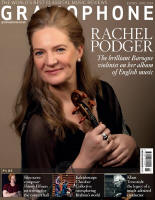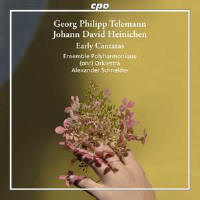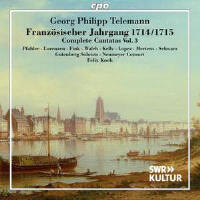Texte paru dans: / Appeared in:
|
|
|
|
|
|
‘Wherever Bach went, Telemann was there before him.’ If not completely true, Reinhard Goebel’s remark is on the right track. Here are two albums of cantatas by Telemann that could well have echoed round Leipzig’s Thomaskirche nearly 20 years before Bach arrived there, and works from a cycle of cantatas for every Sunday of the year composed about 10 years before Bach got going on his.
The three early Telemann pieces on Ensemble Polyharmonique’s release come from the 18th century’s first decade, part of which he spent working in Leipzig. It was a time when German church cantatas were embracing the airy recitatives and self-contained arias of opera but the transition towards this from the more densely serious style of the previous century was still audible. Both Meines Bleibens ist nicht hier and Sei getreu bis in den Tod show both sides in their multimovement layouts linking string sonatas, vocal solos and choral fugues and declamations, while the throughcomposed psalm-setting Ach Herr, straf mich nicht in deinen Zorn has a purely 17th-century feel, rich-textured and in love with tonal beauty like a motet by one of JS Bach’s older cousins. There are numerous moments of loveliness and charm, not least the warmly nocturnal, Vivaldian string-and-lute rustles of the second aria of Meines Bleibens or the yearning violin obbligato of the third aria of Sei getreu. The album also presents a cantata of similar stamp by Heinichen, later to be Kapellmeister at the Dresden court but still a young man in Leipzig in the 17-noughties. The best of its darling little arias is a buoyantly martial number in which a bassoon pretends to be a trumpet.
The four singers of Ensemble Polyharmonique shape and balance the choral movements with skill and feeling, as they have done in their previous releases of German 17th-century sacred music, but they fare less well as soloists – too often an aria is underpowered and/or suffers unreliable intonation. The one-toa-part Polish orchestra are very good, but {oh!} they should do something about that name.
One of the chief architects of the new cantata format was the theologian Erdmann Neumeister, on whose prolific output of librettos Telemann drew regularly over the years. A couple of years ago (4/22) CPO began a project – in conjunction with numerous musicological bodies – to release all 72 cantatas of the annual cycle of Neumeister settings Telemann composed in 1714-15 for the Barfüsserkirche in Frankfurt, where he was by then the city’s director of music; this third volume offers us eight of them. The cycle is known as the ‘French’ for reasons that remain mysterious; despite scholars’ attempts to identify suitably Gallic characteristics, the music, liberally sprinkled with Lutheran chorale melodies, will not be putting you in mind of Charpentier or Lalande. With little left of the 17th century in them either, they sound pretty similar to Bach’s cantatas of the 1720s. True, Telemann’s music is simpler than Bach’s, with a more contented and worldly atmosphere, but quality and attractiveness are givens, and certainly don’t run out in the two-and-abit hours we get here. There isn’t room to catalogue Telemann’s delicious descriptive details here, but examples of his bubbling imagination include brilliantly chattering trumpets and oboes in the martial opening aria of Ich bin getrost im Leben, delightful ‘bird music’ in Weichet fort aus meiner Seele and a panting string motif to suggest a man’s final breaths in the most dramatic of these cantatas, Brich dem Hungrigen dein Brod. (Interesting that while Bach may often use a figure like this to this symbolise death, Telemann is more likely to make it actually sound like it.) There is, too, a level of vocal display that reeks of the opera house – listen to the soprano gymnastics in the second aria of Weichet fort. The sequence of cantatas is broken up on this recording by pleasing, style-aware modern arrangements for orchestra and voices of four of Telemann’s organ chorale preludes (yes, he wrote some of those as well!).
The performances are worthy of the project, with a cast made up of experienced hands in the bass department and fine young singers specially picked for the project, who also sing in the 12-strong chorus. The playing of the Neumeyer Consort is also more than adequate, and the well-judged direction of Felix Koch firmly in the Telemann groove. Plenty more volumes to come, but nothing to get tired of yet. |
|





